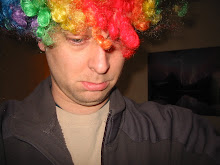Continuing from my earlier posts on this subject, McKay mentions that simply substituting “activity” for “game” can help put into perspective the artistic element of RPGs. In fact, he goes so far as to describe players as artists.
The point I’ve been trying to formulate in attempting to frame the nature of art and RPGs centers around our shared play space. To use McKay's term, in most forms of entertainment, there is an entertainment environment. A circus is an example, and so is a theatre. In the case of role playing games however, the entertainment environment is imaginary. Yes there are rules, and there is even a director of sorts (the GM), but the imaginary entertainment environment is where the game play itself happens. It is a cooperatively constructed meta-space, consisting of the player characters, NPCs, mythology, place descriptions, etc. of a game’s campaign world. It has both static and dynamic aspects, changing spontaneously with the players' (ie. artists') actions and at the director’s discretion and with his or her guidance. In many ways, the construction of this meta-space is the game.
If you still think that role playing games should not be considered an artistic endeavor, as a new type of performance art, consider again that there is no way to win or lose them. Like art, their enjoyment lies in the act of creation - in the case of role playing games, that enjoyment is made greater by the process being explicitly collaborative.
Sunday, September 13, 2009
Subscribe to:
Post Comments (Atom)







4 comments:
I was at a party last night, trying to explain D&D to a neighbor. The only way I could discribe it was that it was like acting, but with dice
Great stuff. I love the term "cooperatively constructed."
I think of it in some ways like jazz, although most people might not find that very helpful. The song, as a concept, has some basis rules (chord progression and a melodic motif) but there is no true song, as such, until the musicians actually play it. I suppose other forms of music and even live theater have that element. I just think of classic jazz because the shape is there at the start, but it the musicians improvise around that chord progression, melodic motif, and each other.
In many ways, the construction of this meta-space is the game.Nice. I do a lot of talking to my players about what they want in terms of adventures, approaches, style of game (role-playing vs combat; disconnected adventures vs connected arcs).
It seems to me that players and GM/DM/CK/Refs experience this meta-space in different ways. GM/DM/CK/Refs primarily through their materials and backstory; players through their characters and encounters. Any thought?
@Pal: I've done the same as it's a start, but the reality as we know is much deeper!
@Axe: I like your analogy with music quite a bit, and jazz as a genre seems the best fit. I'd already been giving some thought to something I think addresses your question, re: the meta-space experience of the GMs - it's a post for tomorrow. I have to laugh a little whenever I say "meta-space", I'm not sure where I came up with that, and looked it up to see if it was even a word (not in my dictionary!), but it still seems to best describe what I'm getting at here.
@ Rusty--Indeed. Improvisational acting, at that.
Post a Comment